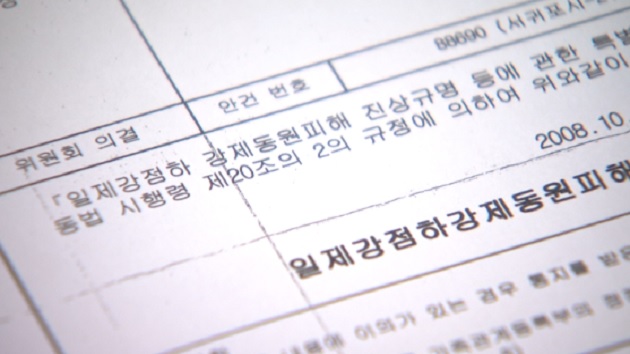
Korea’s Supreme Court upheld a compensation order in October against two Japanese companies over forced labor during Japan's 1910 to 1945 colonial rule of the Korean Peninsula. A large group of plaintiffs in Jeju is now suing the Japanese government over the forced labor. Joseph Kim reports.
[slug]
Islanders conscripted for wartime labor during Japan's colonial rule
Seogwipo-born (이화철) Lee Hwa-cheol's father is one of the wartime labor victims.
His father was forced into labor in a coal mine in Hokkaido during World War II.
[slug]
Lee’s father returned home uncompensated after liberation
He endured the harsh forced labor, longing for his home and family.
After Korea’s liberation, he returned home, but without any pay for the labor.
INTERVIEW
Lee Hwa-cheol / Plaintiff
I believe that Japan should sincerely apologize and compensate for the forced labor. That would help thaw the chilled bilateral ties
[ 인터뷰 이화철 / 일제 강제노역피해 배상 소송단 참가자 ]
"정말로 반성하고 사과하고 보상해야 역사가 원만하게 국민들 마음에서 짐을 내려놓게 해야 (한.일) 양국간의 문제도 좋아지지 않겠나."
His son, Mr. (이화철) Lee Hwa-cheol, is preparing for a class-action lawsuit for damages against the Japanese government with a help of a civic group.
[slug]
Lee decides to join suit after Supreme Court ruling
The Supreme Court upheld a compensation order last year against two Japanese companies, Nippon Steel & Sumitomo Metal Corp. and Mitsubishi Heavy Industries Ltd. over forced labor during Japan's 1910-1945 colonial rule of the Korean Peninsula.
The court's ruling encourages him to join the group suit even though evidence has been lost over time.
[slug]
2,000 islanders join class action
A civic group has sought victims or their families who want to participate in the class action suit since the end of last year.
About 2,000 islanders have joined the legal action.
INTERVIEW
Yang Du-hoon / Plaintiff
My father always used to tell me that he had worked like a slave and had not been given enough food. I came here to join the legal action for him.
[인터뷰 양두훈 / 일제 강제노역피해 배상 소송단 참가자]
"할아버지가 어렸을 때 항상 (제가) 밥을 먹다 흘리면 당신께서 (징용돼서) 얼마나 고생했고 밥도 못먹고 일만했다고 하셨는데 한이라도 풀어드리는 기회가 될까해서 (신청하러) 오게됐습니다."
Japan stationed its troops in Jeju and conscripted Jeju residents into forced labor to build military facilities including air bases in the later stages of the Pacific War, right before Japan surrendered.
[slug]
Many victims reluctant to join suit
But, many of surviving victims who can testify about the forced labor are still reluctant to participate in the lawsuit.
INTERVIEW
Choi Ju-yeon / Federation to Support Japanese Forced Labor Victims
Jeju was a strategic location for Japan during the war. Thousands of residents were drafted. If residents could not meet the rice quota, men and women were forced into labor. Sadly, there is little evidence left.
[인터뷰 최주연 / 일제강제노역피해자정의구현전국연합회 제주본부장 ]
"(제주는) 군사적 요충지였기 때문에 수도 없이 주민들이 거의 대부분 동원됐어요. 공출을 하지 못하면 노역으로 남자건 여자건 끌려가셨는데 그런 증거들이 많이 없어요."
The island suffered most by the Japanese imperialism among the nation’s cities.
Remains of Japanese imperialism in Jeju still remind victims of the painful labor.
[Reporter] Joseph Kim
[Camera] Jwa Sang-eun
Now, it's time for the government to help and support the suit.
Governmental efforts should be made to survey the number of victims of wartime labor and what really happened on the island decades ago.
Joseph Kim, KCTV





